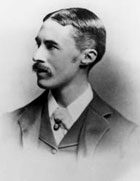The Carpenter's Son Comments
"Here the hangman stops his cart:
Now the best of friends must part.
Fare you well, for ill fare I:
Live, lads, and I will die.
...
Read full text
The author: Born: March 26,1859, Bromsgrove District, United Kingdom Died: April 30,1936 (age 77 years) , Cambridge, United Kingdom Parents: Sarah Jane Housman, Edward Housman Siblings: Laurence Housman Alma mater: St John's College, Oxford Genre:
Fare you well, for ill fare I: In anguish we try to forget the things we love when they live not finding a suitable way to say goodbye. Nice poem.
Beautiful allusion of the crucifixion of Christ through a secular everyday shroud.
nice poem but i suggest member poems should be used as poem of the day and not dead poets.thanks
Biblical allusion at its best. A wonderful way of relating the experience of Jsus Christ on the Cross.
'Bab', Try 'Jesus' in your comment. We readers are easily confused! ! ! ;)
This seems to be a secular version of the Crucifixion. It is not saying pick up your Cross and follow me, but keep your noses clean and you will not end up on a cross!
... at home had I but stayed Much to stop here for further move. The tune is yet for our own perhaps...
I think all of you have missed the point. This is a story of Jesus cruxifiction.
'Here hang I, and right and left Two poor fellows hang for theft: All the same's the luck we prove, Though the midmost hangs for love.' M so in love with this poem, thank you!
'Here hang I, and right and left Two poor fellows hang for theft: All the same's the luck we prove, Though the midmost hangs for love.' M so in love with this poem, thank you!
Serious matter has been made into comic matter in this poem which is quite meaningful and interesting to read!
One word: JESUS. Only a true poet can make simple statements with such synaptics. Lesser endowed like me write straight ones like The Star of Bethlehem.
The love Housman was referring to was obviously Jesus Christ's love for the people and he was condemned for the works and miracles he performed when the high priests recognized it as, what to them, was an attempt to throw them out of power. The rest most people know the story Jesus was hung with two common thieves, one on his left and another on the right. The number 3 is also an important biblical reference of the holy trinity. This poem has overwhelming religious undertones. I can imagine Housman as either a pious man or a boozing, lecherous, sinner who sought atonement in his works. For that answer I will have to read his bio! :)
Besides the obviousness of the title, the following quatrain seems to me to be an unequivocal allusion (and therefore religious reference) to the crucifixion of Christ: 'Here hang I, and right and left Two poor fellows hang for theft: All the same's the luck we prove, Though the midmost hangs for love.
S'pose, you can't know exactly what he died for. But it is a cool poem-sort of feels like a drinking song to me, only instead of swinging a beer stein somebody is actually swinging.
Interesting poem. Saying, best to stay in your own backyard. YET, bringing JESUS, a carpenter, into the picture. JESUS, went forth and built a house of teachings by his word. Further, sent by the Father, for this purpose. If JESUS, stayed in his backyard, his Fathers house of teaching would not have been built. Again, interesting poem.
A secularist take on the crucifixion of Christ. Tightly written with the inspired rhyme of adze and lads.

Am I MISTAKEN? ? 'My church' spoke of 3 wooden crosses, some spikes, a spear, and a crown of thorns. : ))) bri